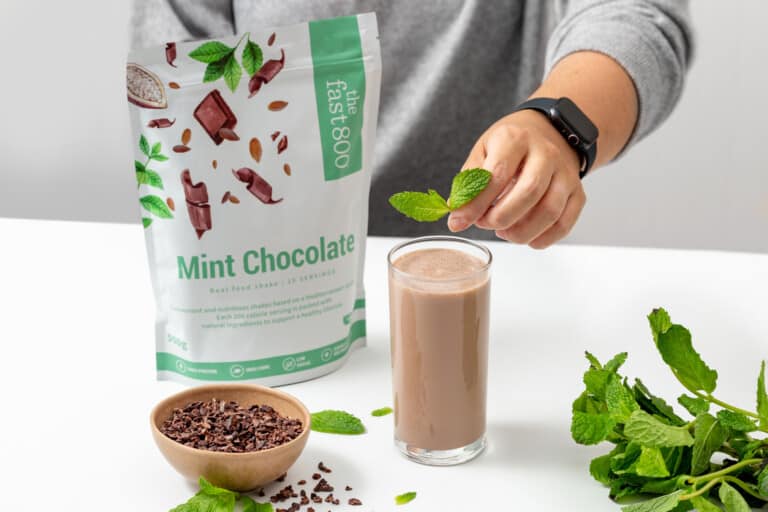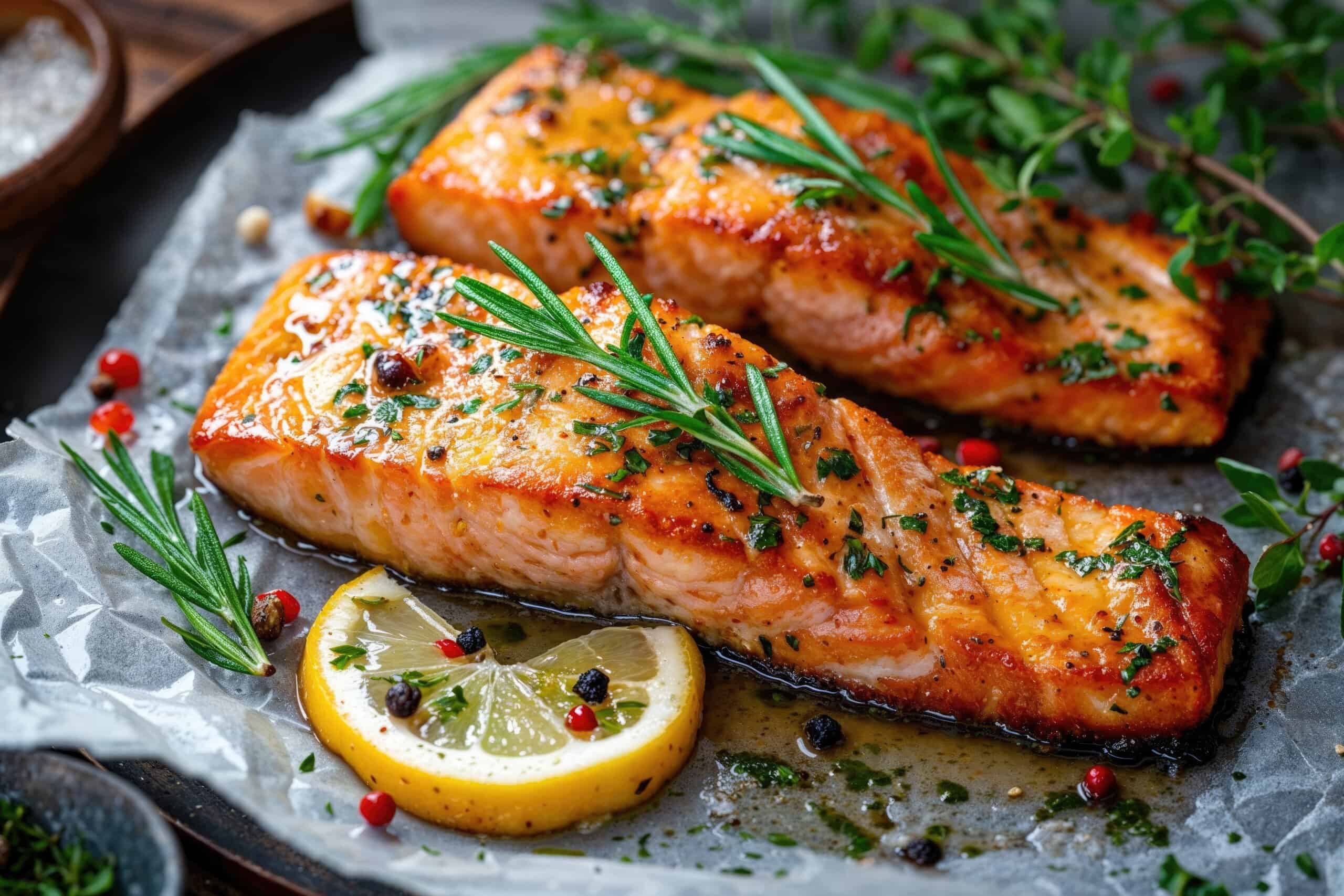Signs you’re not getting enough fibre
Fibre is a form of indigestible carbohydrate, essential for maintaining a happy gut and healthy digestive system.
It feeds the ‘good’ bacteria in your gut, which then help to provide many health benefits, like controlling your immune system, blood sugar, brain function and weight. To reap the full benefits, we recommend consuming 30g of fibre per day, which will require a little more planning on fasting days (800 calorie days). This is why The Fast 800 Fibre Blends (currently available in the UK, Australia and New Zealand) and Shakes can be a helpful addition to your diet, providing a high-fibre boost to your daily intake in just one serving.

Signs you’re not getting enough fibre
If you’re not getting enough fibre in your diet, you may begin experiencing some adverse symptoms, such as:
Constipation
Fibre increases the size and softness of stool, making it easier to go to the toilet.1 Studies have shown that dietary fibre increases stool frequency and can relieve constipation, and one recent review found that 77% of people with constipation found relief when increasing their fibre intake.2 3 So, if you’re finding that you’re struggling with your bowel movements, adding some more fibre into your diet could help.
Fatigue and low energy
While fibre does not provide energy, it does help in energy regulation; if you’re finding that you’re low in energy frequently, your fibre intake could be a good place to start.4 Fibre can support the stabilisation of blood glucose levels, ensuring a slower release of blood sugars, which helps you avoid those energy crashes throughout the day.5 It also arguably indirectly impacts energy levels as a result of its satiety-inducing effects, allowing you to focus better on tasks at hand rather than on feelings of hunger and cravings throughout the day (particularly on 800 calorie days), which leads us to our next point.6
Hungry shortly after eating
One of the most important benefits of fibre is its ability to make you feel fuller for longer. Studies show that dietary fibre increases perceived satiety and regulates appetite by slowing down gastric emptying.7 Therefore, if you are finding that you feel hungry shortly after eating, you likely need to include more fibre into your meals and overall diet. Our Shakes and Fibre Blends are convenient, satiating additions to your diet, even on fasting days: simply add water, and discover the transforming effects that fibre can have on your appetite!
Difficulty losing weight
Another sign you’re not getting enough fibre is difficulty losing weight. If your goal is to lose weight, but you’re feeling that it’s proving difficult, you may need to focus on upping your fibre. As we said, fibre can help reduce your appetite between meals, which in turn can assist with weight loss as there’s less temptation to snack, overeat or give in to unhealthy cravings. Dietary fibre is known to promote weight loss in general and, in particular, belly fat loss. So, ensuring you’re prioritising reaching that 30g goal each day can assist in a healthy weight loss journey.8 9
Try our delicious range of Gut health products (currently available in Australia and New Zealand) and Shakes (available in the UK, Australia and New Zealand) to help you reach our 30g recommendation, even on 800 calorie days.
Anderson JW, Baird P, Davis RH Jr, Ferreri S, Knudtson M, Koraym A, Waters V, Williams CL. Health benefits of dietary fiber. Nutr Rev. 2009 Apr;67(4):188-205. doi: 10.1111/j.1753-4887.2009.00189.x. PMID: 19335713.
Christodoulides S, Dimidi E, Fragkos KC, Farmer AD, Whelan K, Scott SM. Systematic review with meta-analysis: effect of fibre supplementation on chronic idiopathic constipation in adults. Aliment Pharmacol Ther. 2016 Jul;44(2):103-16. doi: 10.1111/apt.13662. Epub 2016 May 12. PMID: 27170558.
Yang J, Wang HP, Zhou L, Xu CF. Effect of dietary fiber on constipation: a meta analysis. World J Gastroenterol. 2012 Dec 28;18(48):7378-83. doi: 10.3748/wjg.v18.i48.7378. PMID: 23326148; PMCID: PMC3544045.
Hervik AK, Svihus B. The Role of Fiber in Energy Balance. J Nutr Metab. 2019 Jan 21;2019:4983657. doi: 10.1155/2019/4983657. PMID: 30805214; PMCID: PMC6360548.
De Leeuw JA, Jongbloed AW, Verstegen MW. Dietary fiber stabilizes blood glucose and insulin levels and reduces physical activity in sows (Sus scrofa). J Nutr. 2004 Jun;134(6):1481-6. doi: 10.1093/jn/134.6.1481. PMID: 15173415.
Hervik AK, Svihus B. The Role of Fiber in Energy Balance. J Nutr Metab. 2019 Jan 21;2019:4983657. doi: 10.1155/2019/4983657. PMID: 30805214; PMCID: PMC6360548.
Salleh SN, Fairus AAH, Zahary MN, Bhaskar Raj N, Mhd Jalil AM. Unravelling the Effects of Soluble Dietary Fibre Supplementation on Energy Intake and Perceived Satiety in Healthy Adults: Evidence from Systematic Review and Meta-Analysis of Randomised-Controlled Trials. Foods. 2019 Jan 6;8(1):15. doi: 10.3390/foods8010015. PMID: 30621363; PMCID: PMC6352252.
Miketinas DC, Bray GA, Beyl RA, Ryan DH, Sacks FM, Champagne CM. Fiber Intake Predicts Weight Loss and Dietary Adherence in Adults Consuming Calorie-Restricted Diets: The POUNDS Lost (Preventing Overweight Using Novel Dietary Strategies) Study. J Nutr. 2019 Oct 1;149(10):1742-1748. doi: 10.1093/jn/nxz117. PMID: 31174214; PMCID: PMC6768815.
De Bock M, Derraik JG, Brennan CM, Biggs JB, Smith GC, Cameron-Smith D, Wall CR, Cutfield WS. Psyllium supplementation in adolescents improves fat distribution & lipid profile: a randomized, participant-blinded, placebo-controlled, crossover trial. PLoS One. 2012;7(7):e41735. doi: 10.1371/journal.pone.0041735. Epub 2012 Jul 27. PMID: 22848584; PMCID: PMC3407232.











